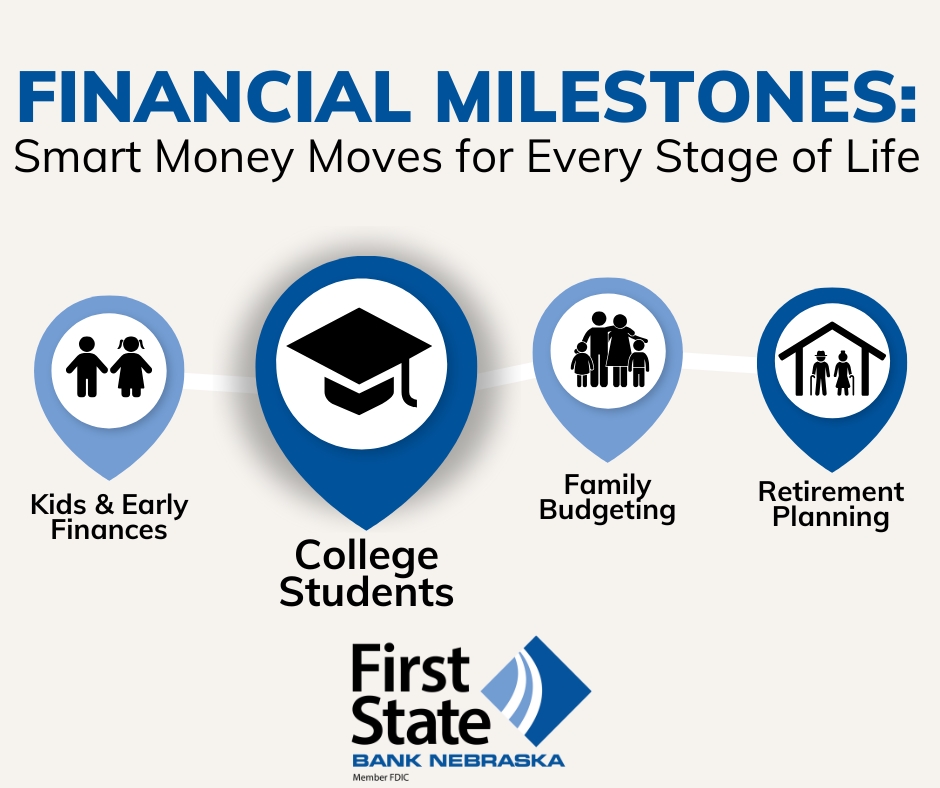
Financial Milestones: Smart Money Moves for College Students & First-Time Independence
Stepping out on your own for the first time—whether heading to college, starting a job, or moving out—brings exciting freedom, but it also comes with big financial responsibilities. Without a plan, it’s easy to fall into debt or struggle to make ends meet. Here’s how to set yourself up for success and build smart money habits from day one.
1. Create (and Stick to) a Budget
When you’re managing money for the first time, a budget is your best friend. Start by listing your monthly income (from a job, financial aid, or parental support) and subtracting your essential expenses, such as:
- Rent & Utilities
- Groceries & Dining Out
- Transportation (Gas, Bus Fare, Rideshares)
- Insurance (Health, Car, Renter’s)
- Subscriptions (Streaming, Gym, etc.)
Whatever is left should go toward savings, emergency funds, and personal spending. Using a budgeting app or a simple spreadsheet can help you track your money and avoid overspending.
2. Be Smart About Credit and Debit Cards
Credit cards can be a useful tool, but they can also be dangerous if not managed properly. A few key rules to follow:
- Start small – Consider a low-limit student credit card to begin building credit.
- Pay your balance in full – Avoid interest charges by not carrying a balance month to month. Always pay your card off each month.
- Use credit wisely – Stick to small, necessary purchases (gas, groceries) rather than impulse buys.
Debit cards, on the other hand, are connected directly to your checking account, making them a great option for everyday spending. Since funds are withdrawn immediately, they help you stay within your budget and avoid debt. To help you manage your debit card with ease, our Card Central feature in the mobile banking app gives you more control, security, and convenience—like turning your card on or off, setting spending limits, viewing transaction details, and quickly reporting a lost or stolen card.
Using credit and debit cards wisely—and taking advantage of tools like Card Central—can help you stay in control of your finances and spend smarter every day.
3. Build an Emergency Fund
Unexpected expenses will pop up—car repairs, medical bills, or a broken laptop—and having a financial cushion can keep you from relying on credit cards or loans. Even setting aside $10–$20 per paycheck into a savings account can add up over time. Aim to keep at least $500–$1,000 in a starter emergency fund.
4. Take Advantage of Student Discounts & Freebies
Many companies offer student discounts on everything from software and streaming services to travel and entertainment. Always ask if there’s a student rate before making a purchase! Your school may also offer free financial workshops, food pantries, or career resources—use them!
5. Start Saving for the Future Now
It might seem early, but the sooner you start saving for big goals—like buying a car, traveling, or even retirement—the easier it will be later. If your employer offers a 401(k) with matching contributions, take advantage of it as soon as you start working full-time. Even a small investment now can grow significantly over time!
Small Steps Lead to Big Financial Wins
Taking control of your money in your late teens and early 20s will set the stage for long-term success. Start with the basics—budgeting, saving, and using credit wisely—and you’ll be on the right path to financial independence.


0 comments